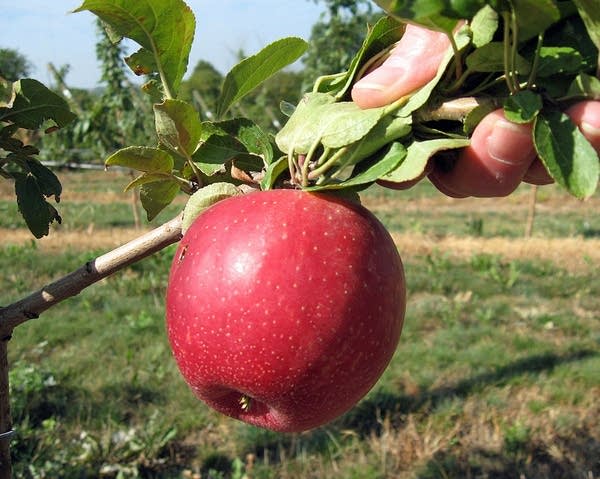Early warmth worries apple growers

The early warmth of spring could spell trouble for insects, birds and plants as well as apple growers - especially if April brings a hard frost.
The National Weather Service has forecast above-average warmth through April though state climatologist John Young said it would not be unusual for a hard freeze - down to 28 degrees or colder - to hit during April.
That worries Andy Meyer, who owns Kickapoo Orchard near Gays Mills. He said his apple trees are already in leaf and could be flowering by mid-April - a month early.
"One night of 20-degree cold could wipe everything out," Meyer tells the State Journal. "It would kill our production for the year."
Create a More Connected Minnesota
MPR News is your trusted resource for the news you need. With your support, MPR News brings accessible, courageous journalism and authentic conversation to everyone - free of paywalls and barriers. Your gift makes a difference.
Last week he and other orchard owners struggled to break out their spraying equipment to protect against the disease apple scab. Meyer said he's trying to keep up with a spring that's moving at hyper-speed.
"Today, I'm already behind," Meyer said. "You're trying to get a month's worth of work done in a week. It stresses you out."
Insects are also coming out four to five weeks ahead of schedule, said Phil Pelletteri, a University of Wisconsin-Madison entomologist. Not included among those early emergers, however, are mosquitoes, he added, which need spring rains to breed and hatch.
Bill Mueller, an ornithologist with the Western Great Lakes Bird and Bat Observatory, said long-range migrating birds have evolved over thousands of years so their arrival is timed to the emergence of certain insects they rely on for food - insects that may already have shown up and left for the year. Or early migrants could perish in freezing April snowstorms or cold spells, he added.
"I find it worrisome, to say the least," Mueller said.
Molly Fifield-Murray, outreach and education manager for the UW Arboretum, said it's entirely possible that green and flowering plants and trees could suffer come April. Oak trees, for example, that have newly unfurled leaves could be damaged by a freeze that would turn their greening leaves ragged and brown. It's an affliction known as "tatters," Fifield-Murray said.
Longtime birdwatcher Mike McDowell said he has seen some species arrive weeks earlier in Madison. There have already been reports of hummingbirds at feeders, and McDowell said there have been some unconfirmed reports of neotropical migrants from Central and South America.
"I've never seen anything like it," he said.
---
Information from: Wisconsin State Journal
(Copyright 2012 by The Associated Press. All Rights Reserved.)
